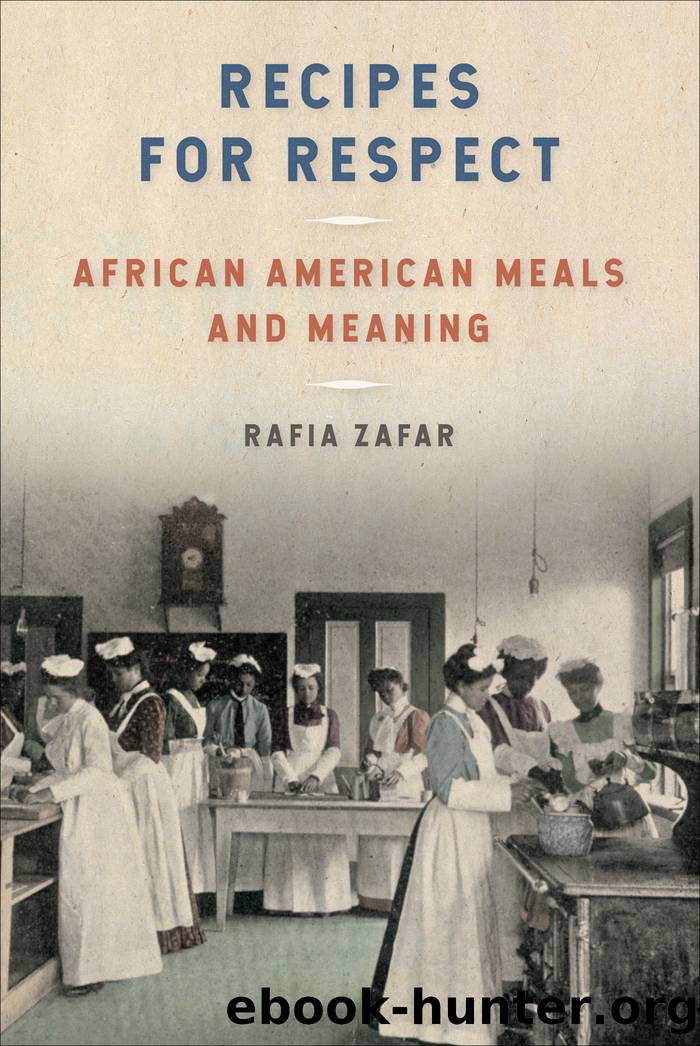Recipes for Respect by Rafia Zafar;

Author:Rafia Zafar;
Language: eng
Format: epub
Publisher: University of Georgia Press
Published: 2019-01-15T00:00:00+00:00
7
The Negro Cooks Up His Past
Arturo Schomburgâs Uncompleted Cookbook
Among the papers of the Puerto Ricanâborn Arturo (a.k.a. Arthur) Alfonso Schomburg, one of the twentieth centuryâs most important bibliophiles, rests an unpublished manuscript labeled â[cookbook].â1 Many scholars of the Schomburg Center for Research in Black Culture and its founder, and even his descendants, have little idea that the noted archivist of the African diaspora showed a serious interest in food.2 Schomburgâs typescript, including a page in his own hand, proposes a historical Black gastronomy divided âinto three partsâMorning, Noon and Nightâwith appropriate meal time victuals and between-time snacks.â3 His plan, to make visible the ânegro geniusâ in gastronomy, was in keeping with his lifeâs work. The archetypical unsung individual who âadapted the English, French, Spanish and Colonial receipts taught him by his masters ⦠to his own temperamental needsâ would be celebrated along with âhis own peculiar artistic powersâ (1). So he would acknowledge the unsung talents of the many whose names went unrecorded.4 As he so famously wrote in The New Negro, âThe Negro has been a man without a history because he has been considered a man without a worthy culture.â5 Schomburgâs projected gastronomy would script a master recipe for respect, a culinary narrative complementing the history and achievements of Black people.
That Schomburgâs groundbreaking compendium was never completed is something of a mystery. Textual evidence dates its composition around 1930, suggesting there were some years between its initial draft and his death in 1938. Its unfinished state perhaps attests to the vastness of the subject he contemplated coupled with the scant primary sources available. Menus, cookbooks, and hospitality guides were even more rare than the âbooks, pamphlets, prints and old engravings ⦠[writings on] social service and reform ⦠[and] efforts towards race emancipation, colonization, and race bettermentâ that made up nearly the entire original collection.6 If scholarship of the African diaspora was still in its early stages, even more nebulous would have been the study of Black domestic service, cookery, and foodways, a subject supported by rich anecdotal evidence but few documents.7 Whatever his initial intentions, what remains of Schomburgâs volume are fewer than two dozen pages of historical survey, a bit of personal memoir, an extensive list of recipe titles, a few handwritten notes, and a single recipe for okra gumbo taken from Lafcadio Hearnâs classic New Orleans cookbook.8
Of the extant twenty-two manuscript pages, nine are arranged in menu format, broken down into daily mealtimes with subheads for categories such as breads and meats. The introductory pages indicate he planned to write biographies of prominent and little-known cooks alike and reveal the history of cooking in the United States as shaped by those of African descent. The handwritten notes (figure 7.1) that follow the typed proposal and precede the La Cuisine Creole recipe for âGumbo of Okra or Fileeâ illustrate the range of Schomburgâs inquiry. Schomburgâs tome could have been an omnibus that stretched over centuries, American states, and extranational locales. The enormous scope was in keeping
Download
This site does not store any files on its server. We only index and link to content provided by other sites. Please contact the content providers to delete copyright contents if any and email us, we'll remove relevant links or contents immediately.
Southern Living 2023 Annual Recipes by Editors of Southern Living Editors of;(551)
The Official Cookbook of the Chile Pepper Institute by Paul W. Bosland(494)
Alaska Sourdough, Revised Edition by Ruth Allman(494)
The Gilded Age Cookbook by Becky Libourel Diamond(462)
Southern Inspired by Jernard A. Wells(446)
Chili madness : a passionate cookbook by Butel Jane(446)
Southern Living - Slow-cooker Cookbook by The Editors of Southern Living(446)
Forage. Gather. Feast. by Maria Finn(443)
Southern Living 2022 Annual Recipes by Southern Editors of;(427)
Truly Texas Mexican by Adán Medrano(418)
New England Soups from the Sea by Craig Fear(414)
The Justin Wilson Cookbook by Unknown(412)
Borealis Breads by Jim Amaral & CYNTHIA FINNEMORE SIMONDS(411)
Lilo and Stitch: The Official Cookbook: 50 Recipes to Make for Your 'Ohana by Tim Rita(408)
My Vermont Table by Gesine Bullock-Prado(407)
Pulp by Abra Berens(406)
Southwest Table by Dave Dewitt(404)
Sisters by Louisa May Alcott(402)
Southern Living - Homestyle Cookbook by The Editors of Southern Living(401)
